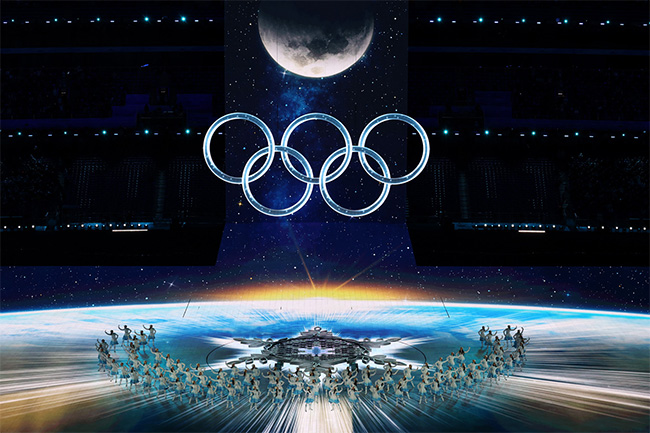2022 Winter Olympics opening ceremony kicks off in Beijing
February 4, 2022 09:39 pm
A Winter Olympics overshadowed by human rights concerns and taking place inside a strict Covid-secure bubble kicked off in Beijing on Friday with a glittering opening ceremony at the “Bird’s Nest” stadium.
The distinctive lattice-shaped arena took centre stage, just as it did at the 2008 Games – seen as China’s coming-out party to the world – as Beijing becomes the first city to host both a Summer and Winter Olympics.
Chinese President Xi Jinping declared the Games open, triggering a burst of fireworks and wrapping up a ceremony filled with imagery of ice and snow. Xi’s declaration was followed by red-suited “skaters” sliding across virtual ice.
Held on the first day of spring by the Chinese calendar, the ceremony began with a performance by dancers waving glowing green stalks to convey the vitality of the season, followed by an explosion of white and green fireworks that spelled the word “Spring”.
On a three-dimensional cube resembling a block of ice, lasers carved figures from each of the previous 23 Winter Games. The block was then “broken” by ice hockey players, enabling the Olympic rings to emerge, all in white.
That was followed by the traditional “parade of nations”, with each of the 91 delegations preceded by a woman carrying a placard in the shape of a snowflake resembling a Chinese knot.
In keeping with Olympic tradition, the parade was led into the stadium by Greece with the rest ordered by stroke number in the first character of their Chinese name, which meant Turkey was second, followed by Malta, with host China going last and drawing roars from the stadium crowd.
The entrances for “Hong Kong, China”, as well as for Russia, also generated applause.
Russian President Vladimir Putin, the highest profile foreign leader present for the Games, could be seen in the stadium without a mask. However, the athletes from his country were unable to carry its flag due to doping violations, marching instead under the standard of the Russian Olympic Committee.
Directed by Zhang Yimou, reprising his role from Beijing’s 2008 Summer Games triumph, the event featured 3,000 performers on a stage comprised of 11,600 square metres of high-definition LED screen resembling an ice surface.
All of the performers were ordinary people from Beijing and nearby Hebei province, with “the Story of a Snowflake” the central thread. Themes included “environmental protection and low carbon emission”, Zhang previously told state media.
But China’s assertion that these will be a “green Games” has been challenged by some experts because they are taking place in one of the driest places in the country and on almost entirely man-made snow.
‘Not well suited’
There are other concerns, including warnings from some Western nations about surveillance of their athletes and what will happen to them if they make anti-China comments or other displays of protest against local authorities.
Gus Kenworthy, a British freestyle skier, said he would not be silenced and called China “not well suited” to be hosts.
“In my opinion I don’t think any country should be allowed to host the Games if they have appalling human rights stances,” he told the BBC.
China’s hosting of the Winter Games has drawn criticism since the International Olympic Committee selected Beijing in 2015, and countries including the United States, Britain and Australia staged diplomatic boycotts, meaning they did not send government representatives to the Games.
On Thursday’s eve of the Olympics, about 500 Tibetans marched outside the International Olympic Committee headquarters in Lausanne, Switzerland.
They held banners reading “Boycott Beijing Winter Olympics”, “Stop human rights violations in Tibet” and “Games of shame”.
There were also small-scale demonstrations in Los Angeles and San Francisco.
Tibet has alternated over the centuries between independence and control by China, which says it “peacefully liberated” the rugged plateau in 1951 and brought infrastructure and education to the previously underdeveloped region.
But many exiled Tibetans accuse China’s ruling Communist Party of religious repression, torture and eroding their culture.
Watching from afar
Concerns about Covid loom large at these Games. The nearly 3,000 athletes and tens of thousands of support staff, volunteers and media have been cut off from Beijing’s general population.
China, where the virus emerged in late 2019, has pursued a no-nonsense zero-Covid policy nationwide and has adopted the same approach to the Games, with everyone cocooned inside the bubble having daily tests and required to wear a mask at all times.
They cannot leave the “closed loop” until the Games are over.
There have been more than 300 Covid cases in the bubble, among them an unknown number of athletes.
Germany said Thursday six members of its team had tested positive on arrival in Beijing, without saying if those concerned were athletes or support staff.
Unlike the huge celebration that greeted the 2008 opening ceremony, locals this time will have to enjoy it on television.
Zhang Tao, a 43-year-old property developer, said he hoped the Games would have meaning beyond sport.
“I really hope the Olympics can sweep away the gloom of Covid,” he told AFP.
(France 24 with AFP and Reuters)













